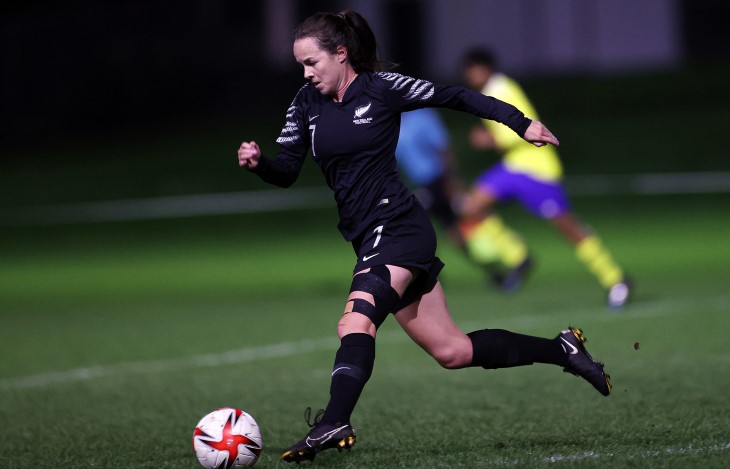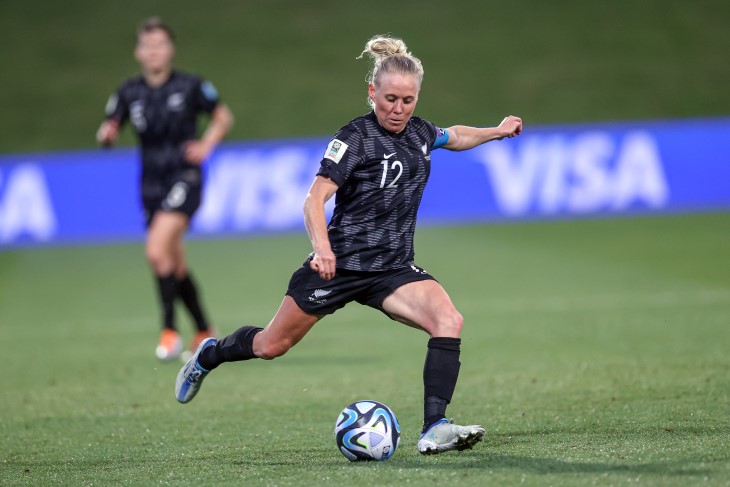Stacey's story: The long road back for Coast captain
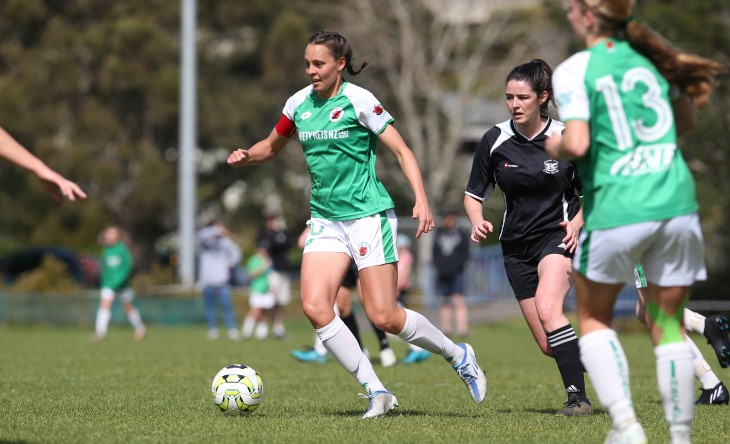
Football player Stacey Martin has been on a challenging journey to get back to playing the game she loves after she ruptured her ACL in 2020. She is telling her story to encourage others to invest in their bodies to prevent injury.
After what she’s been through, Stacey Martin will never take playing football for granted again.
The Hibiscus Coast women’s captain ruptured the anterior cruciate ligament (ACL) in her knee while training in 2020 and it took her 12 months to recover and get back to playing the game she loves.
She vividly remembers the feeling of her first training reuniting with her Coast team-mates.
“I’ve never been happier,” says the 27-year-old, who grew up just north of Auckland in Stanmore Bay, located on the Whangaparaoa Peninsula.
“I’d just missed it so much. I’d stayed with the team the whole season, so when I got back to training and playing with the team it was even more special. They knew what I’d gone through.”
In November 2020, Stacey was selected for the Northern Lights to play in the Women's National League and during training she went down in a heap with no one around her.
“I went to tackle someone and turned to run away with the ball but collapsed to the ground,” she says.
“I knew straight away I’d done my ACL. I was lying on my side and it hit me that I was going to be out for a long time.”
Starting again
On the drive home, Stacey was talking to her partner, and she burst into tears.
The next morning, she was assessed by a physio. Her worst fears were confirmed when she underwent X-rays and an MRI scan.
The former Whangaparaoa College student ruptured both her ACL and ALL (anterolateral ligament), and also had a meniscus (knee cartilage) tear.
In her recovery, Stacey damaged her meniscus and had to have a second surgery.
She remembers the pain of having to learn how to walk again.
“I had to start everything again,” she says. “Even running or kicking the ball for the first time, you feel so uncoordinated. Do I even remember how to do this?”
It was a hugely challenging period and she was unable to work in her role as a nurse for eight weeks.
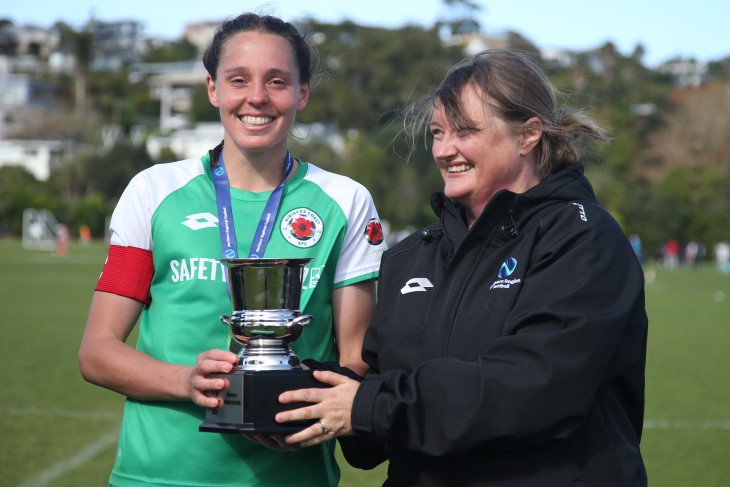
Stacey holds the Carol Waller Cup, after winning the league in 2022. Photo credit Shane Wenzick / Phototek.
Supporting others in their rehab
Unfortunately, Stacey was not alone.
Four other players in her team also had ACL reconstructions in recent times. One of them had the same injury on both legs.
“I reassured them of the process they were going through and helped them with the mental struggles. I was there to talk if they needed me. It’s a lonely process coming back from this injury.”
Stacey has introduced the team to strength training programmes and activation routines, as well as completing the 11+ warm-up before every training and game. It’s a key component of the New Zealand Football Performance and Prevention programme.
“It’s so important, especially for the young ones. It’s their routine now and it will set them up. When our team comes to training, they know exactly what to do.”
Stacey and the Hibiscus Coast team did the double in 2022 – they won the league and also the Carol Waller Cup to complete a memorable season.
They’re now competing with the best in the upper North Island in the women’s northern premier league and it’s been a step up.
“Over the years, we’ve seen young players grow up on the Coast and then leave for bigger clubs, which is something I did. But it’s nice to know the youth in this area have something to look up to and aim for.”
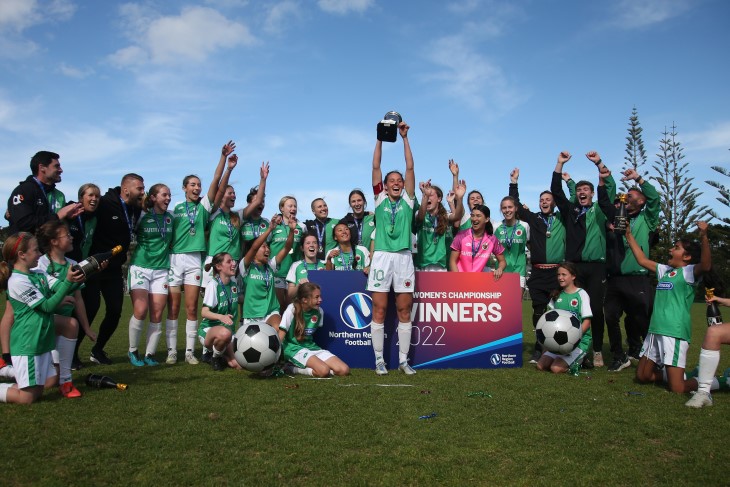
Stacey and her Hibiscus Coast football team with the Carol Waller Cup. Photo credit Shane Wenzick / Phototek.
Stacey says it’s an exciting time for football with New Zealand and Australia preparing to co-host the FIFA Women’s World Cup in July and August.
She believes it will be an inspiring moment for the next generation of players.
“I used to play with and against a few of the players who are currently in the Football Ferns so I’m excited to follow the team's progress and see how they can compete with these world-class teams,” she says.
“It’s also a great opportunity to get more girls and women playing football in New Zealand and I hope it inspires our younger girls to continue to play in the future.”
The cost of football-related injuries
In 2022, ACC accepted nearly 40,000 claims for football-related injuries.
A review of ACL injuries saw the greatest increase in females aged 15 to 19 years, with the incidence increasing by 120 per cent between 2009 and 2019.
The minimum time for an ACL reconstruction rehabilitation is nine months.
That's why ACC partners with New Zealand Football to deliver its Performance and Prevention programme, which helps players enhance their performance and reduce the risk of injury.
“There are some unique female-specific considerations when it comes to reducing the risk of injury in sport,” says ACC injury prevention partner Nat Hardaker.
“We work with NZ Football to ensure injury prevention is an integral part of the game here. This is critical to ensuring we can support everyone to keep playing and maximise their enjoyment of the game.
“The 11+ warm up is an evidence-based programme designed to prepare players for the demands of the game. It includes exercises that really target strength and control of the lower limbs.”
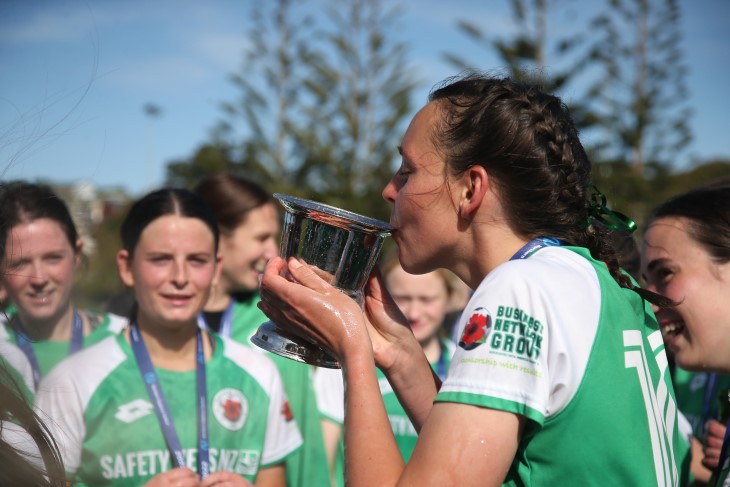
Stacey and the Carol Waller Cup. Photo credit Shane Wenzick / Phototek.
Stacey says her injury gave her a new perspective. When she was younger, she didn’t think warming up or band activations were necessary.
“You need to invest in your body to play this sport well,” she says.
“When I think about my injury, I realise I was working long hours and wasn’t eating well - I always reflect on that day. I wasn’t hydrated, there were so many things that led to my injury."
What is the NZF Performance and Prevention programme?
- It’s a player welfare and prevention programme for all athletes.
- It provides support mechanisms for enhancing player performance, injury prevention, welfare and wellbeing.
- The 11+ warm up is an evidence-based programme designed to prepare players for the demands of the game. It includes exercises that target strength and control of the lower limbs.
- Find out more at the NZ Football Performance and Prevention programme website: nzfpandp.co.nz




